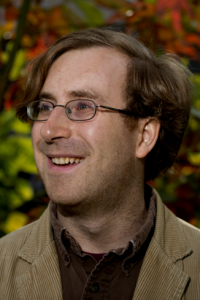A: As a child I had many interests, including music, and also cartooning, video games, and TV shows like “The Simpsons.” But music has played an important role in my life from the beginning. I would say that I became “serious” about music around the age of 12 or 13. Since high school and in college, it has become more and more of a focus in my life.
A: Yes, I would say so. From a very early age I was exposed to many different kinds of music. My father has musical training in composition and piano, and schooled me in the great works of Classical music from a young age. My mother, though not a trained musician, also immersed me in a lot of good music, particularly popular music of the 60’s and 70’s, and music from the Golden Age of Broadway Theatre. My sister is a musician as well and studied French horn in high school.
A: It’s hard to pick just one. I love the great American composers of the 20thCentury, including Charles Ives, Aaron Copland, and Samuel Barber, as well as pre-War European masters like Béla Bartók and Igor Stravinsky. But I also hold a special place in my heart for 19th-Century composers like Brahms and Schumann. Like them, I like to draw inspiration from nature, and I share their respect for tradition. In particular, I think Brahms understood better than anyone that he was part of a rich and well-developed musical lineage. For living composers today, this is all the more true–we have all the great music that Brahms had, plus all the great music written since then.
A: I like a lot of living composers, including Steve Reich, John Adams, John Corigliano, William Bolcom, and Louis Andriessen. At the same time, I think I draw my greatest inspiration from the composers of the past.
A: Music is central to human society–try living without it! We use music to mark all of our important occasions: weddings (“Here Comes the Bride”), funerals (“Taps”), graduation (“Pomp and Circumstance”), the New Year (“Auld Lang Syne”), and so on. Albert Einstein said that musical intuition was the driving force behind his idea for the theory of relativity. Any society that does not recognize the power of music, does so at its own peril.
A: Yes, I think my Jewish identity is a big part of my music. I grew up hearing and singing a lot of good music in Temple, and as I got older, I became increasingly interested in all of the wonderful musical traditions of Jews in America. This includes the Classical sphere, but also Broadway, Jazz, Rock ‘n’ Roll, and music from film and television.
A: Outside of music, my interests include science, poetry, history, and board games.
A: Again, it’s hard to pick just one, but Brahms’ German Requiem, Copland’s Fanfare for the Common Man, and Barber’s Knoxville: Summer of 1915 come to mind.
Absolutely illuminating! Also, I’m pleased to announce that Ezra is accepting new clients looking to commission music! Personally, I can’t think of a more unique gift than that. Full details can be found here http://ezradonner.bitnamiapp.com/commission-a-work/


Great interview! I especially loved his answer to the composing process. I feel that way about my writing sometimes. Before it really starts to take on form and texture it definitely just feels like I am grasping at air and bumping into everything.
That is so awesome that you were able to interview someone like Ezra! It sounds like you gathered a lot of great information from him!
I admire any composer. I can’t fathom trying to come up with an original, I just don’t have that ability. I’d start, and then end up with some sort of tune from pop radio…
I love it that you chose to interview a composer! I took music composition twice in high school. I was quite the orchestra nerd. Your interviewee mentioned Aaron Copeland. I like Aaron Copeland’s “The Hoedown” I wanted to conduct that piece for my high school graduation but it was too advanced for our full orchestra. It was that “Pork it’s what’s for dinner” theme music. =) I hope you had a good Passover!
I agree that one of the best things about meeting other people is getting to know other people! I have only done one interview in my 6 years of blogging. I enjoyed yours and should do more myself 🙂
Great interview, you did a really good job! I was surprised that one of his favourite composers is Béla Bartók, who was Hungarian like me 🙂